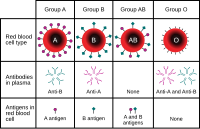
Photo from wikipedia
Alloantibodies against human platelet antigen (HPA) are pathogenic agents involved in the development of several alloimmune thrombocytopenias, such as fetal and neonatal thrombocytopenia (FNAIT), platelet transfusion refractoriness (PTR), and post-transfusion… Click to show full abstract
Alloantibodies against human platelet antigen (HPA) are pathogenic agents involved in the development of several alloimmune thrombocytopenias, such as fetal and neonatal thrombocytopenia (FNAIT), platelet transfusion refractoriness (PTR), and post-transfusion purpura (PTP). To date, the HPA system consists of 35 antigens in the HPA Gene Database (https://www.versiti.org/ hpa); among these, the clinical significance of HPA-15 on CD109 glycoprotein, previously named Gov antigen, is still mostly unknown. The unknown significance of HPA-15 is partly because it is difficult to detect HPA-15 antibodies; their low expression on platelets' surface has meant that only a limited number of studies on HPA-15 antibodies have been performed. This review summarizes the current understanding of HPA-15 and alloantibodies against it, focusing on their history, laboratory testing, clinical implications, and future perspectives.
Journal Title: Transfusion
Year Published: 2022
Link to full text (if available)
Share on Social Media: Sign Up to like & get
recommendations!